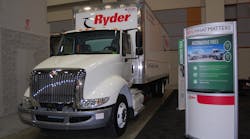Putting a price tag on the total cost of a natural gas-powered heavy truck remains a tricky and often incomplete proposition at best, according to a panel of fleet executives gathered for the Alternative Clean Transportation (ACT) Exposition held in Washington D.C. this week, though the potential long-term benefits to using natural gas as a heavy truck fuel remains very attractive as well.
“We’re talking about a true American fuel here, one produced and consumed by our country,” explained Jeff Shefchik, president of regional TL carrier Paper Transport, whose operation has tested two natural gas-fired highway tractors since 2010 and is now in the process of placing 50 natural gas–powered vehicles into service within its 390 unit fleet.
Having natural gas-powered equipment “has also helped us win business,” Shefchik explained, as more and more freight customers focus on sustainability issues within their own operations.
“We’re definitely getting a PR [public relations] benefit from our natural gas tractors,” added Mike Lickert, corporate fleet manager for the private fleet operation at grocer Giant Eagle, which currently operates 20 natural gas-fired tractors and has 40 more on order for its 216 unit fleet.
“It’s also important to note that all the capital dollars we’re investing in natural gas equipment – the tanks, the compressors for our filling station, etc. – that’s all produced in our country,” he stressed. “That’s money all going back into local economies.”
The critical piece to making natural gas work within a fleet operation, however, is understanding the cost factors involved, where the savings can be gained, and how much potential business can be gained by “going green” in this manner, Paper’s Shefchik emphasized – especially when it comes to examining capital equipment costs, maintenance expenses, and potential fuel savings.
On the front end, Shefchik noted that the natural gas-fired tractors used at Paper Transport come with a significant $60,000 premium – costing on average $185,000 per unit versus $125,000 for a traditional diesel-powered model. He added that Paper’s tractors typically accumulate 110,000 miles annually and that company owns them for seven years – meaning that by year seven, much of the usable life of the vehicle is expended, so it is largely sold for parts and scrap.
Yet Shefchik calculates Paper Transport will get a higher residual value for the natural gas versions of its 7-year old tractors – some $30,000 versus $20,000 for the diesel models – due to the value of the natural gas fueling components. Thus, when all is said and done, on a cost per mile or CPM basis, Paper’s natural gas tractors cost 6.5 cents per mile more on a capital investment basis versus its diesel tractors.
Shefchik also noted his fleet adds 1 cent per mile more to the maintenance cost of its natural gas tractors, too, to cover the extra expense of more frequent oil changes, inspections/repairs for natural gas components, etc.
Fuel savings is of course where Paper recoups all of the extra expense associated with natural gas vehicles, typically saving 10.5 cents per mile due to the lower cost per gallon equivalent of natural gas when compared to diesel fuel. That typically translates into a $3,300 in savings per year per tractor, thus allowing Paper to achieve payback on its initial natural gas truck investment in four to five years.
“You’ve got to take into account, though, that diesel fuel prices fluctuate a lot; what we’re paying today may rise or fall dramatically tomorrow,” Shefchik stressed.
He also noted that the vastly improved fuel economy of today’s diesel-powered tractors is acting as a “payback inhibitor” to some degree when compared to natural gas. “The 2014 model diesel tractors we’re using get 7.8 mpg on average, whereas the natural gas tractors are getting the equivalent of 5.8 mpg,” Shefchik said. “We need to move the needle on natural gas fuel economy because carriers like us are driven by CPM.”
Still, Scott Perry, VP-vehicle supply management for Ryder System, believes natural gas powertrains will only improve in terms of efficiency while the price point for natural gas fuel will remain far more stable than diesel.
“There’s lots of opportunity to keep improving this [natural gas truck] product, everywhere from assembly processes to engine efficiency,” he said. “I for one would expect to see 20% improvements in engine efficiency on a year-over-year basis as the technology improves.”
Yet it is the stability from a price point that Perry thinks is “the most impressive thing” about natural gas. “Over the last four years it hasn’t shifted more than 10 cents on a gallon-equivalent basis; that’s a tremendous benefit from a fleet budgeting perspective,” he explained. “That’s one reason why natural gas is not a ‘project’ at Ryder; it’s a full-blown strategic initiative.”



